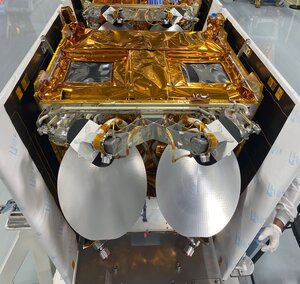Sentinel-1 operations
The Sentinel-1 mission is a polar-orbiting satellite constellation for the continuation of Synthetic Aperture Radar (SAR) operational applications.
Sentinel-1 is a C-band imaging radar mission that provides an all-weather day-and-night supply of imagery for Copernicus user services. The first of the dual Sentinel-1 satellites, -1A, was launched on 3 April 2014 and its identical twin, -1B, was launched on 25 April 2016.
Dedicated to the Copernicus initiative, Sentinel-1 is ensuring the continuity of C-band SAR data, building on ESA’s and Canada’s heritage SAR systems on ERS-1, ERS-2, Envisat and Radarsat.
The mission
The Sentinel-1 satellites are operated from ESA's ESOC mission control centre in Darmstadt, Germany.
| ROLE | Earth observation - all-weather day-and-night radar imagery as part of Europe's Copernicus programme |
| LAUNCH DATE | 1A: 3 April 2014 | 1B - 25 April 2016 timeframe |
| LAUNCHER/LOCATION | Soyuz, Kourou (both launches) |
| LAUNCH MASS | 2300 kg each (two satellites) |
| ORBIT | Near-polar, Sun-synchronous, about 690km |
| PERIOD | 12-day repeat cycle; 175 orbits/cycle |
| NOMINAL MISSION | 7 years |
| ++ Imaging global landmasses, coastal zones and shipping routes at high resolution ++ | |















 Germany
Germany
 Austria
Austria
 Belgium
Belgium
 Denmark
Denmark
 Spain
Spain
 Estonia
Estonia
 Finland
Finland
 France
France
 Greece
Greece
 Hungary
Hungary
 Ireland
Ireland
 Italy
Italy
 Luxembourg
Luxembourg
 Norway
Norway
 The Netherlands
The Netherlands
 Poland
Poland
 Portugal
Portugal
 Czechia
Czechia
 Romania
Romania
 United Kingdom
United Kingdom
 Slovenia
Slovenia
 Sweden
Sweden
 Switzerland
Switzerland


























